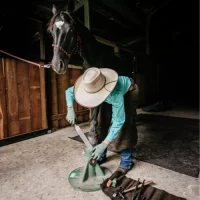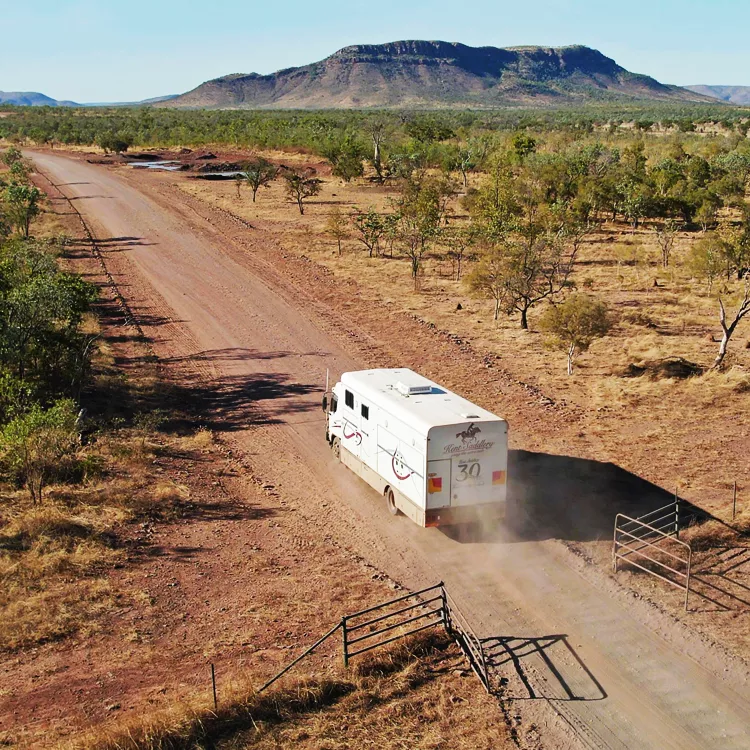Rita Williams, Station Cook. Mt Isa
“A decent meal… sweets and all”
Rita Williams could be described as “a good old fashioned station cook,” as well as “welcoming,” “friendly,” “jovial,” “loving” and “hospitable“. Rita was born in Winton, West QLD where her Dad was a railway worker and musterer. She grins and asks, “I don’t have to say the date or anything do I?”
Rita always called Dajarra home but as an adventurous sixteen year old, she set out for Sydney. For four years she worked at a factory making hessian bags. “I made a lot of friends….. all different nationalities.” Rita laughs, “some of us girls made more bags than our quota. We got called the bonus bashers.” Six years at a marquee factory followed; sewing tents, water bags, banners and national and club flags. “Cutting the different shapes and colours and sewing them to get a great result….. I loved that too!” Rita then returned to West QLD, closer to her parents and while cleaning at the Boulia hotel, the manager asked her to do some cooking. “I was embarrassed….. I said, “I can’t cook”, but I had a go and enjoyed it.” With her confidence boosted, Rita took on a housekeeping job at Lake Nash Station, on the Barkly, N.T. there she met somebody,…….
Frank Marshall, ringer, horse breaker and horse tailer. They teamed up and for ten years travelled and worked together. At Austral Downs, next door to Lake Nash, Rita was approached to be the camp cook. “Again I was that embarrassed. I didn’t know about camp oven cooking. But I wanted to learn so I gave it a go. I was not too proud to ask some of the old ringers. Some of them are good cooks, you know.” Very soon, Rita was turning out apple pies and baked puddings; tasty additions to hearty beef meals. “I was popular, even though I say so. They’d compliment me and I’d want to do better!”
A bright recollection of that time is a double decker bus, used as a stock camp vehicle. “It still had Kings Cross to Wynyard Station on it, and do you know what colour they painted it? Canary Yellow! You could see it from miles away.” The bus was equipped with laminated cupboards and upstairs were nine skinny little bunks. The kitchen boasted a six burner gas stove and outside a sink with running water. Rita smiles broadly. “I had it easy you know, but me and my partner slept in a tent, the others liked sleeping outside, and I wanted to learn to cook in camp ovens, outside on the open fire. I hardly ever used the big stove”. She warms to the subject! “Oh yeah, camp ovens make the BEST roast dinners. The flavour right through the meat is succulent you know! The food is never hard or dry or anything….. I was proud of myself. That’s what I wanted to do!”
Partnering with Frank, Rita had some interesting and challenging experiences. “Contract mustering; that was rough!” In hindsight, Rita can see the funny side of being bogged…. numbers of times. “We’d have to cut logs, dig in the mud and collect twigs…… anything to help the tyres get a grip.” One wet season, she and Frank set out from Austral Downs in a new Falcon panel van. A sea of water surrounded them and Rita, “frightened of snakes and things you know,” had to walk in front of the vehicle to gauge the waters’ depth. They spent hours getting through a gully, and Rita, completely covered in mud, valiantly pushed the van as Frank revved it “like a jet plane” up and over the creek bank. She beams, “I was skinny then you know….. couldn’t do it today….. no strength!”
The couple continued to move around and worked together at Muroanan Station, (where Rita learned to make jam,) Fort William, Lucknow Station, and around Middleton. “For a while we lived in my family’s big tin shack on the banks of the Bourke river. That was good!”
This remarkable woman is also willing to share that “there were some rough patches in all that.” She and Frank decided to be married; however Rita’s plans and hopes were sadly, short lived. “We bought the wedding rings on the Wednesday and on the Friday he was killed in a car accident. Two weeks from getting married, I had to go and cancel everything. Gee it knocked me around.” The resilient lady then returned to Mt Isa where she took up cooking at an Aboriginal hostel. Twenty one years later she was made redundant and that’s when she came to Calton Hills. She’d gone to school in Dajarra with manager Keith Chapman, whom she describes “as a good boss. I told Keith I’d give it four months, then six months, and now its six years.” Rita loves the atmosphere of the station and the country around. She adopts a caring, grandmotherly role in the lives of the young indigenous workers. “I know them all and I know their families.” She maintains a no nonsense approach; punctuality, washed faces and hands, brushed hair and clean clothes are all prerequisites for entry to Rita’s kitchen. She smiles generously, “They work hard. I like them to come home and have a decent meal….. sweets and all.”
The Calton Hills station group photos are displayed on the fridge and Rita maintains that “everyday, no matter what, we look at the photos.”
Photos are precious to Rita, especially those she took in earlier years. “I’m glad I did that; it’s history for me.” It’s a privilege to know some of her history, and she can be certain that she’s a history maker everytime she cooks up a tasty good old fashion meal.
Note: Rita no longer works at Calton Hills Station. She’s living in Mt Isa, just down the road.
Image captions:
1) Frank
2) Rita and the yellow camp bus, Austral Downs Station
3) Camp Cook Rita, Austral Downs Station















